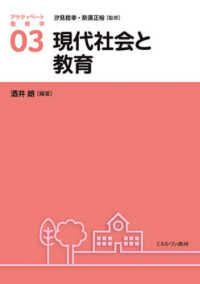Full Description
Reversing F. O. Matthiessen's famous description of translation as "an Elizabethan art", Elizabethan literature may well be considered "an art of translation". Amidst a climate of intense intercultural and intertextual exchange, the cultural figure of translatio studii had become a formative concept in most European vernacular writing of the period. However, due to the comparatively marginal status of English in European literary culture, it was above all translation in the literal sense that became the dominant mode of applying this concept in late 16th-century England. Translations into English were not only produced on an unprecedented scale, they also became a key site for critical debate where contemporary discussions about authorship, style, and the development of a specifically English literary identity converged. The essays in this volume set out to explore Elizabethan translation as a literary practice and as a crucial influence on English literature. They analyse the competitive balancing of voices and authorities found in these texts and examine the ways in which both translated models and English literary culture were creatively transformed in the process of appropriation.
Contents
Gabriela Schmidt, "Introduction"
Werner von Koppenfels, "Elizabethan Translation - A Polyphonic Art: Reconciling the Demands of Letter and Spirit"
Marie-Alice Belle, "Elizabethan Defences of Translation, from Rhetoric to Poetics: Harington's and Chapman's 'Brief Apologies'"
Susanne Bayerlipp, "'All gentilmen dooe speake the courtisane': Negotiations of the Italian Questione della lingua in William Thomas and the Florios"
Margaret Tudeau-Clayton, "'Mine own and not mine own': The Gift of Lost Property in Translation and Theatre"
Gabriela Schmidt, "Staging the Classics: Translation and Authorship in Ben Jonson's Poetaster"
Robert Cummings, "The Province of Verse: Sir Thomas More's Twelve Rules of John Picus Earle of Mirandula"
Claudia Olk, "Travelling Translations: Classical Literature in mid-sixteenth-century England"
Guyda Armstrong, "The Framing of Fiammetta: Gender, Authorship, and Voice in an Elizabethan Translation of Boccaccio"
Selene Scarsi, "'Did Ariosto write it?' - (Mis)translating Women in Sir John Harington's version of Orlando Furioso"
Deirdre Serjeantson, "Translation, Authorship, and Gender: The Case of Jane Seager's Divine Prophecies of the Ten Sibills"
Iris Oberth, "Appropriating France in Elizabethan Drama: English translations of Robert Garnier's Plays"
Felix Sprang, "'Ex rebus ipsis non solam ex libris': Translating the Arts and Sciences in Elizabethan England"
Francisco José Borge Lopez, "'It is I that am the right Sancho Pansa, that can tell many tales': Thomas Shelton's Translation of Don Quixote (1612/1620)"





